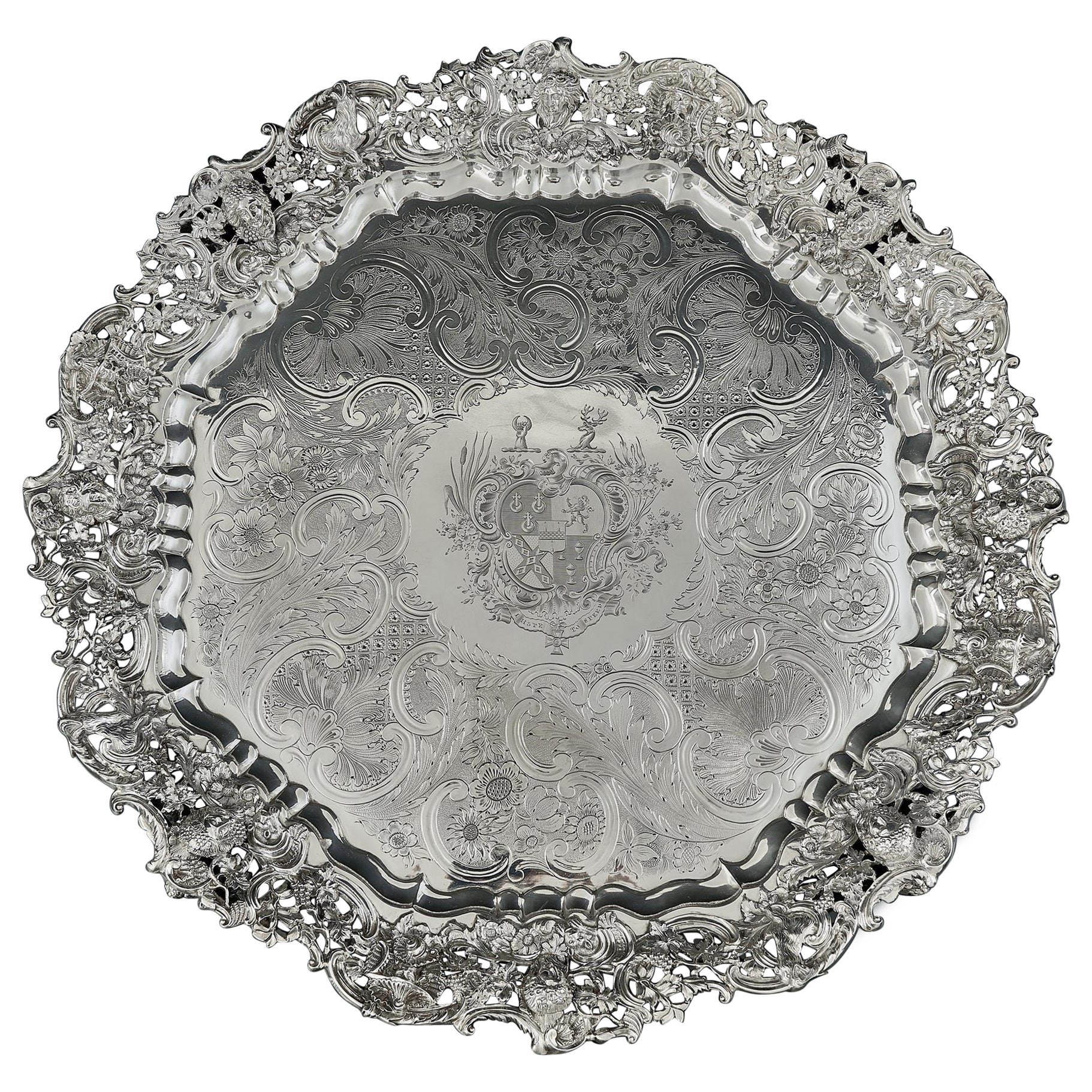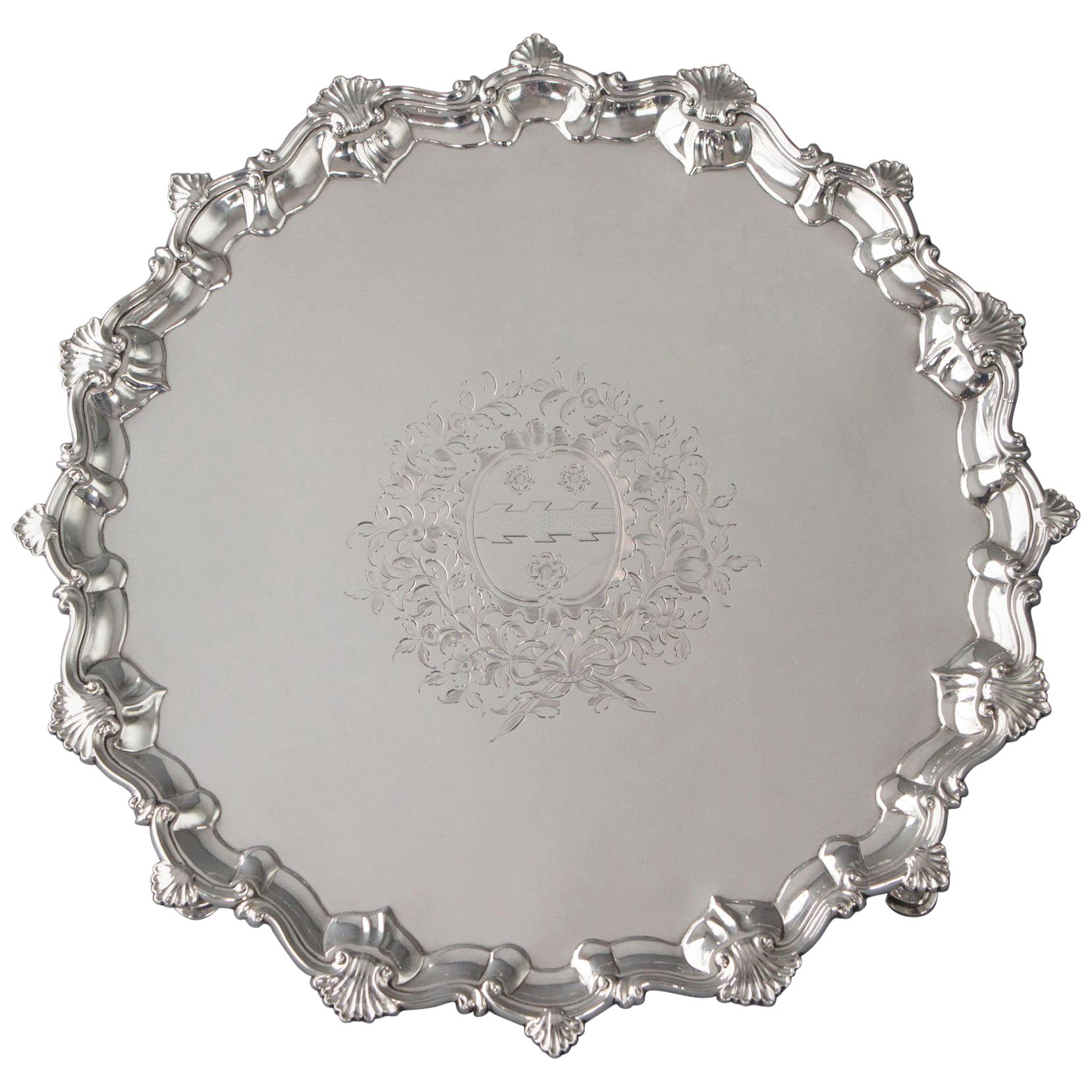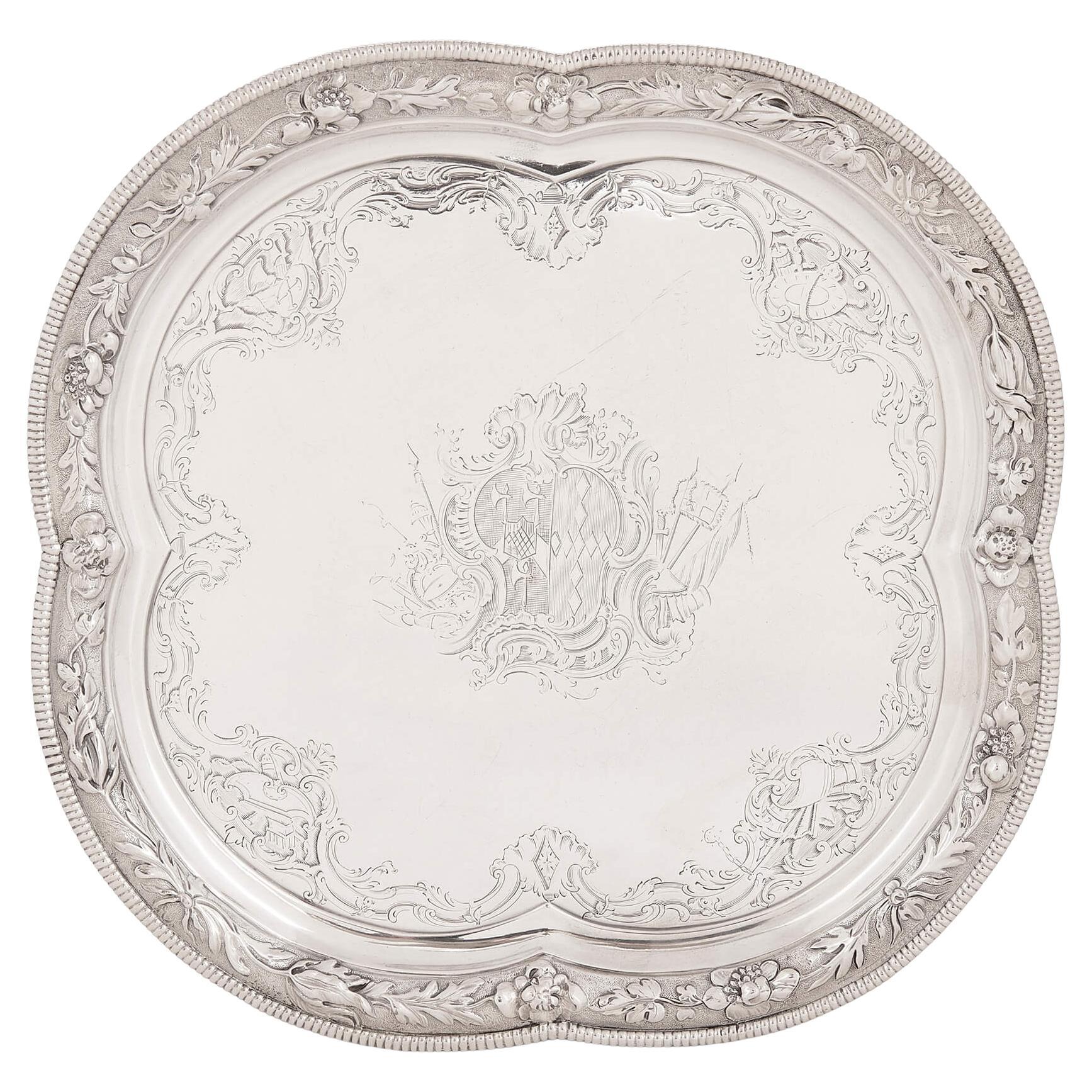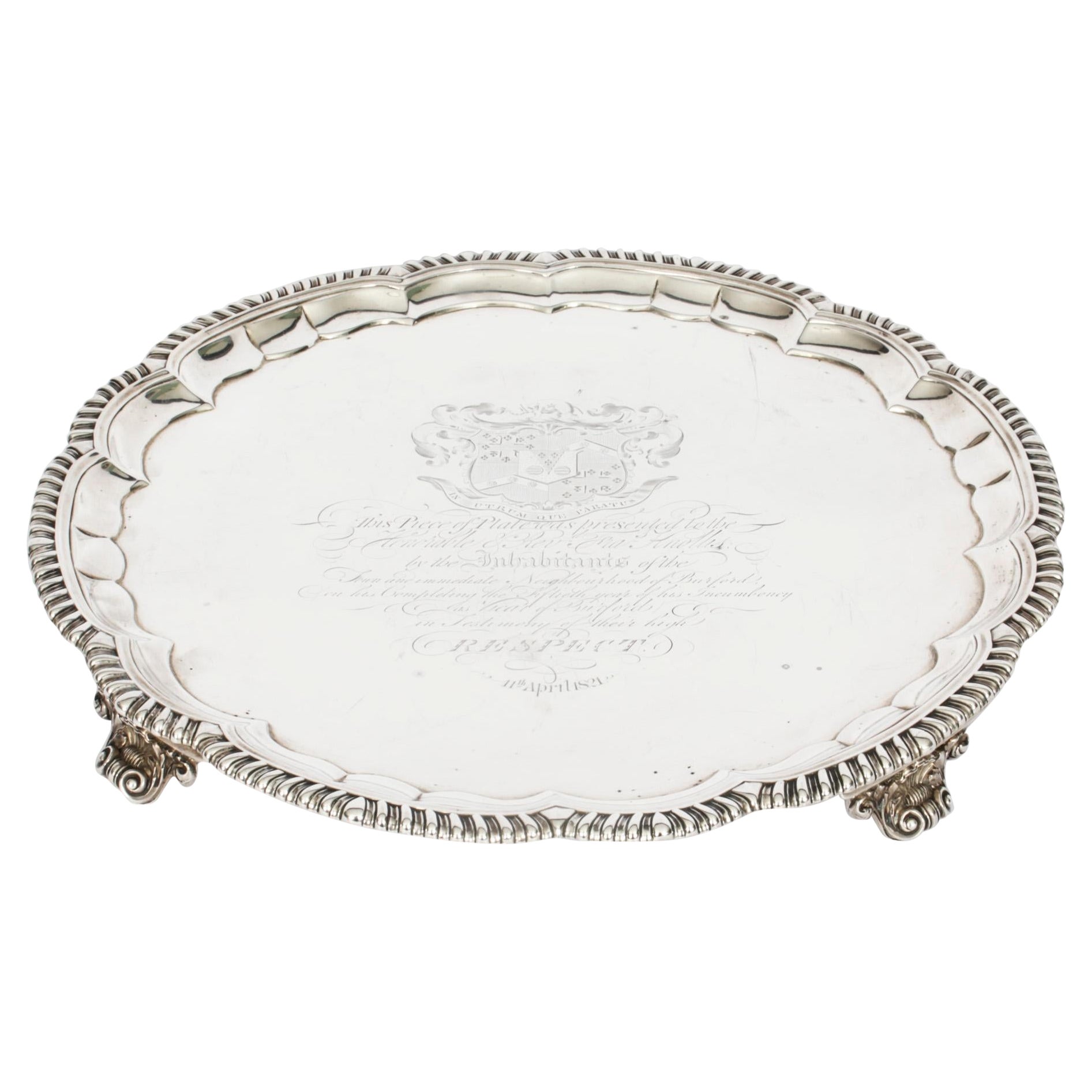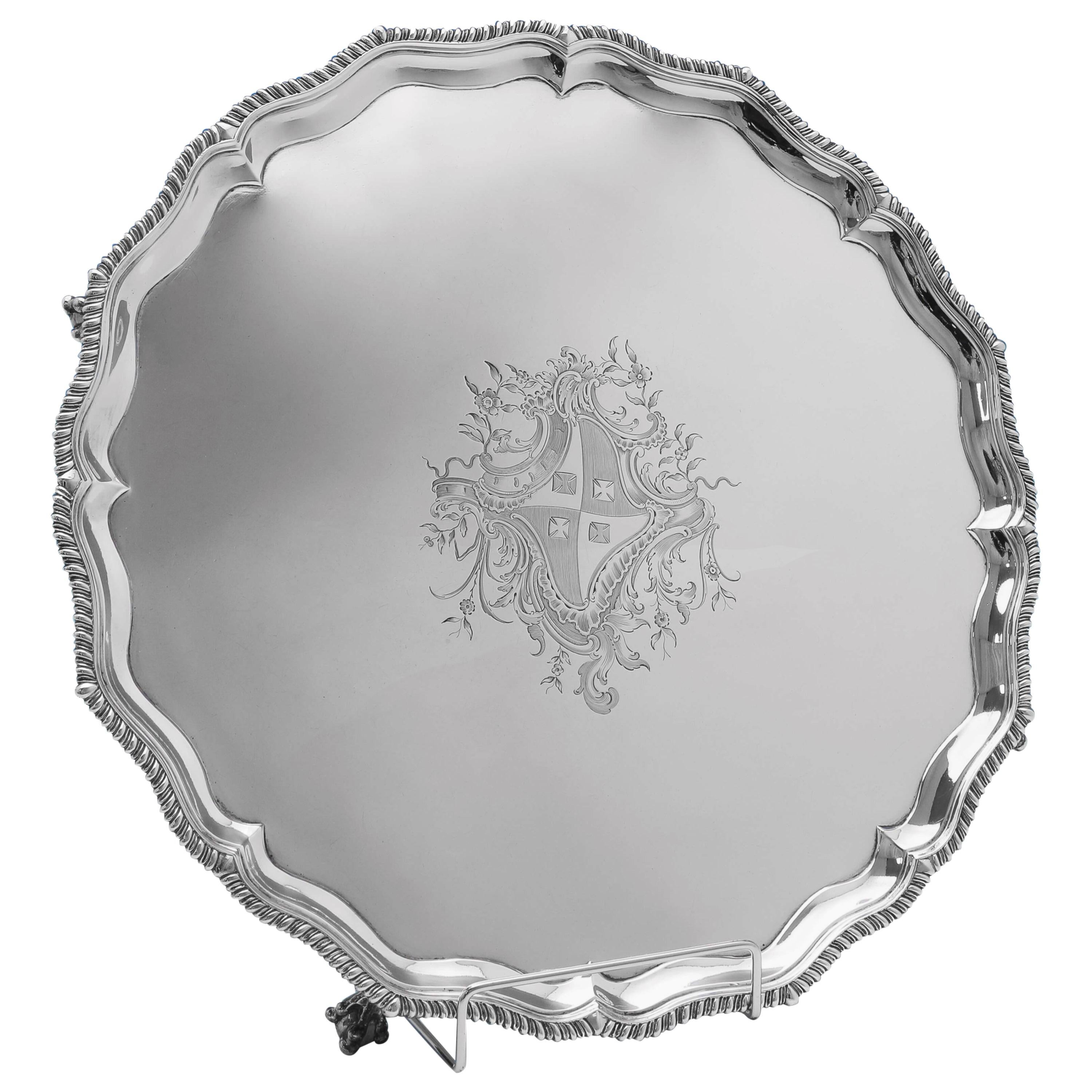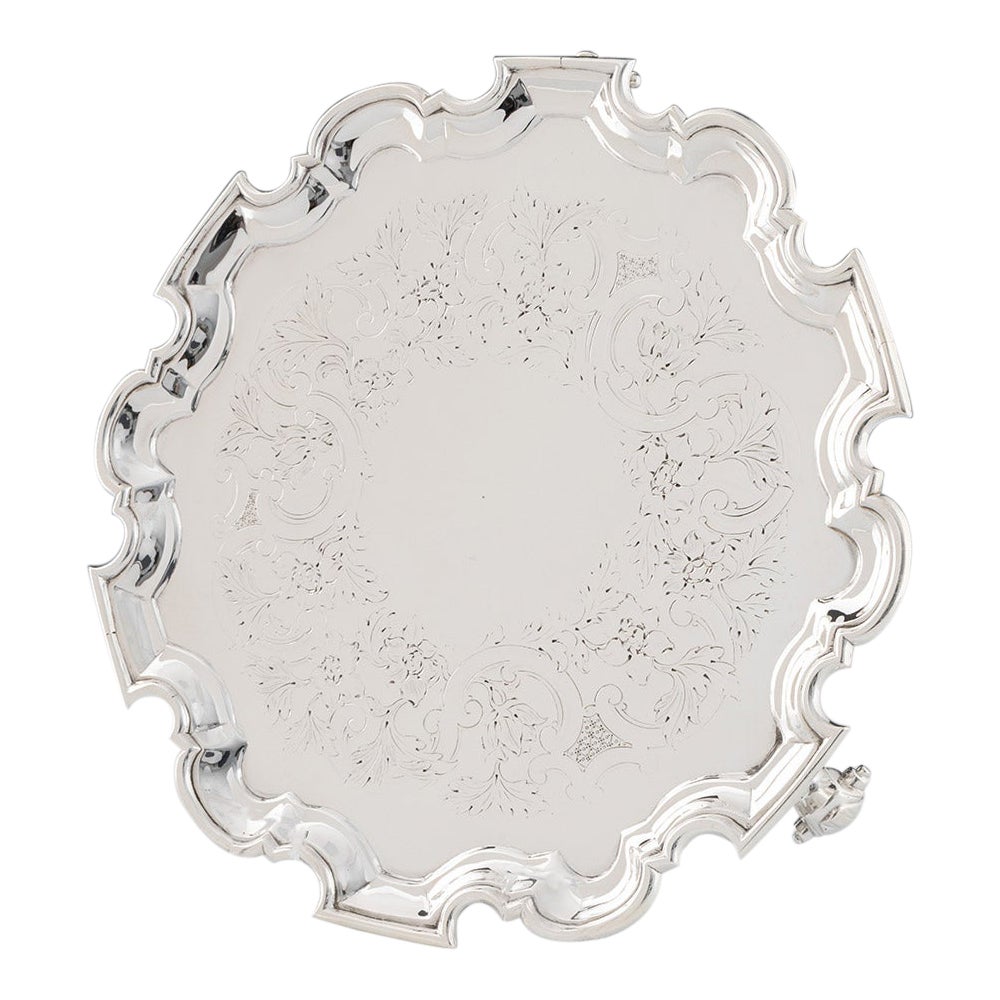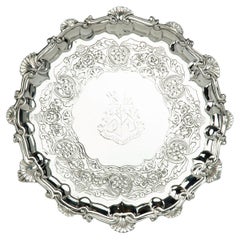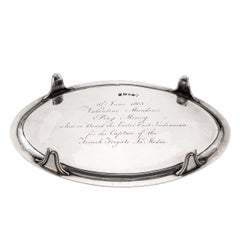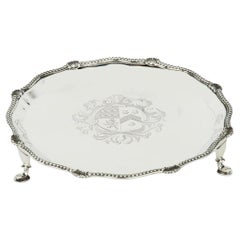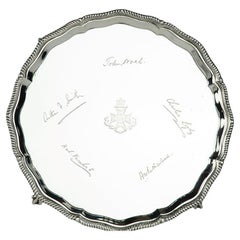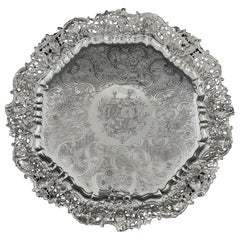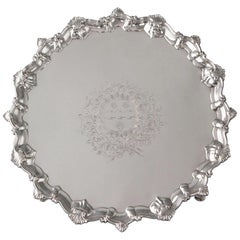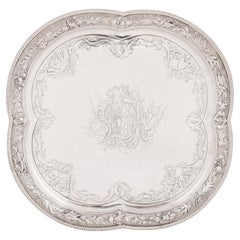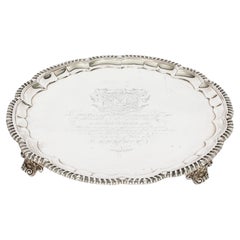Items Similar to Silver salver of a Hero of Trafalgar: Captain Pryce Cumby London, circa 1836
Want more images or videos?
Request additional images or videos from the seller
1 of 7
Silver salver of a Hero of Trafalgar: Captain Pryce Cumby London, circa 1836
$20,070.04
£14,625
€17,195.93
CA$27,711.21
A$30,729.68
CHF 16,146.17
MX$375,464.48
NOK 202,010.59
SEK 189,621.45
DKK 128,371
About the Item
A William IV silver salver with shellwork and scroll border, on four feet, profusely chased and engraved with foliate decoration and inscribed in the centre beneath a widow’s coat of arms: The bequest of Susannah Widow of Captn David Pryce Cumby R.N. to his Son Captain William Pryce Cumby R.N. C.B. Hallmarked for William Ker Reid, London 1836.
Captain William Pryce Cumby, RN, CB, (1771-1837) was the second son of Commander David Pryce Cumby RN (died 1814) and his first wife Eleanor. Following Eleanor’s death, Commander Cumby married, secondly, in 1783 Susannah Marsh (c1758-1836) by whom it appears he already had a child. William Pryce Cundy entered the Navy in 1784 serving in a succession of ships before passing as lieutenant in 1793. A less-than-meteoric rise saw him appointed first lieutenant to Captain John Cooke in Bellerophon, 74-guns, in November 1804. Within a year, Cumby took command of the ship when Cooke was mortally wounded at the height of the Battle of Trafalgar. Before dying on his own quarterdeck, Cooke implored Cumby ‘never to strike’. During the action, Bellerophon sustained a ferocious assault by the French ship L’Aigle requiring Cumby on one occasion to intercept and throw overboard a grenade with a burning fuse which could have destroyed his ship. When L’Aigle eventually limped away, Cumby took possession of two Spanish prizes, Monarca then Bahama. Cumby received the highest praise for his conduct during the battle being promoted commander and post-captain in quick succession before Nelson’s funeral in January 1806, which he attended in official capacity as a follower. He subsequently commanded Drydon, 36 guns, and Polyphemus, 64-guns, in the West Indies, before transferring to Hyperion, 42-guns, in which he captured the American brig Rattlesnake after a lengthy chase in the Bay of Biscay. His last appointment was superintendent to Pembroke Dockyard where he died on 27 September 1837, just eighteen months after his step-mother Susannah bequeathed him this silver salver.
About the Seller
5.0
Recognized Seller
These prestigious sellers are industry leaders and represent the highest echelon for item quality and design.
Gold Seller
Premium sellers maintaining a 4.3+ rating and 24-hour response times
Established in 1982
1stDibs seller since 2013
133 sales on 1stDibs
Typical response time: 2 hours
Associations
LAPADA - The Association of Arts & Antiques Dealers
- ShippingRetrieving quote...Shipping from: Lymington, United Kingdom
- Return Policy
Authenticity Guarantee
In the unlikely event there’s an issue with an item’s authenticity, contact us within 1 year for a full refund. DetailsMoney-Back Guarantee
If your item is not as described, is damaged in transit, or does not arrive, contact us within 7 days for a full refund. Details24-Hour Cancellation
You have a 24-hour grace period in which to reconsider your purchase, with no questions asked.Vetted Professional Sellers
Our world-class sellers must adhere to strict standards for service and quality, maintaining the integrity of our listings.Price-Match Guarantee
If you find that a seller listed the same item for a lower price elsewhere, we’ll match it.Trusted Global Delivery
Our best-in-class carrier network provides specialized shipping options worldwide, including custom delivery.More From This Seller
View AllA George IV crested silver tray commemorating the marriage Colonel Thomas Arthur
Located in Lymington, Hampshire
A George IV crested silver tray commemorating the marriage of Lieutenant Colonel Thomas Arthur, 3rd Dragoon Guards, of circular form, raised upon three ...
Category
Antique Early 19th Century English George IV Platters and Serveware
Materials
Silver
Valentine Munden’s Prize Money Silver Salver, London, 1792
Located in Lymington, Hampshire
This small oval George III silver salver is raised on four scroll feet with a plain field and curvetto within a triple reed border. The reverse is engraved ‘June 18th 1803 Valentine Munden’s Prize Money when on board the Exeter East Indiaman for the Capture of the French Frigate La Medée.’ Maker’s mark of John Crouch & Thomas Hannam, London 1792.
The naval action took place on the 4th of August 1800 off the coast of Brazil. On that morning, the Royal Navy escort, Belliqueux sighted a squadron of French frigates and, giving chase, captured the largest ship La Concorde whilst the East Indiamen, Exeter and Bombay Castle pursued and took the surrender of La Medée. The Coutts and Neptune were unsuccessful in capturing a third frigate La Franchaise, but the action stands out as the only occasion during the Napoleonic Wars when a merchant vessel captured a French ship of war...
Category
Antique 1790s English Sterling Silver
Materials
Silver
A Victorian silver armorial tray presented to Brig. General Sir Bertram Portal
By Charles Boyton
Located in Lymington, Hampshire
A Victorian silver armorial tray presented to Brig. General Sir Bertram Portal, 17th Lancers, of rounded form with a bracketed, gadrooned rim with eight scallop shells, raised on th...
Category
Antique Late 19th Century English Victorian Tableware
Materials
Silver
A George V silver presentation salver for The King’s Royal Rifle Corps
By Goldsmiths & Silversmiths Co. Ltd.
Located in Lymington, Hampshire
A George V silver presentation salver for The King’s Royal Rifle Corps, (60th Regiment of Foot), of circular form with a gadrooned border, raised on four claw and ball feet, the centre with a regimental badge with a Peninsula War...
Category
Early 20th Century English Tableware
Materials
Silver
Presentation silver to the Master Shipwright of Captain Cook’s Endeavour
Located in Lymington, Hampshire
A George III shaped circular silver salver, plain within a shell and scrolling wave border and outer gadrooned edge, engraved with the royal coat of arms, crest and motto (period 1714-1800) of King George III and, on the reverse with a presentation inscription: For the Launching of His Majestys sloop ‘Otter’ 14 Gunns 305 Tonns 26 October 1767 & His Majestys ship ‘Egmont’ 74 Gunns 1643 Tonns 29 August 1768 by Mr Adam Hayes Master Shipwright of his Majestys yard at Deptford; further monogrammed A*H P A*M. Hallmarked for Benjamin Cartwright, London, 1769
Adam Hayes (1710-1785) began his career as ship’s carpenter in Centurion during Commodore Anson’s famous voyage around the world...
Category
Antique 1760s English George III Nautical Objects
Materials
Silver
Larchmont Yacht Club Silver Racing Trophy
Located in Lymington, Hampshire
An American silver trophy bowl from the Larchmont Yacht Club, New York State, presented to the yacht 'Pup' in 1905, winner of the MBYC (Mission Bay ...
Category
Antique Early 1900s American Sports Equipment and Memorabilia
Materials
Silver
You May Also Like
Large George IV silver salver
By Joseph Craddock 1
Located in London, GB
A superb quality antique silver salver or charger in the highly decorative rococo style. Made during the reign of George IV, this large silver salver has a cast openwork border fine...
Category
Antique 19th Century British George IV Platters and Serveware
Materials
Sterling Silver
George II Silver Salver, Richard Rugg, London, 1759
By Richard Rugg
Located in Cornwall, GB
An excellent silver salver with scrolling shell pattern rim and the whole resting on four hoof feet. The center engraved with an armorial. (see pictures) The armorial is surrounded b...
Category
Antique 1750s English George II Platters and Serveware
Materials
Sterling Silver
18th Century Silver Salver by Paul de Lamerie
By Paul de Lamerie
Located in London, GB
18th century silver salver by Paul de Lamerie
English, 1744
Height 3cm, diameter 27cm
Hailing from the workshop of the eminent Dutch-born English sil...
Category
Antique 18th Century English Rococo Sterling Silver
Materials
Silver
Antique Large William IV Silver Tray Salver by Paul Storr 19th Century
By Paul Storr
Located in London, GB
This is a wonderful English antique William IV sterling silver tray, or salver, by the world famous silversmith Paul Storr.
It has clear hallmarks for London 1820 the makers mark of Paul Storr.
It is typical of his work with the octafoil shape and the exquisitely detailed reeded rim, and it is raised on four delightful foliate and scroll feet.
The centre is engraved with a shield shaped coat of arms which I have had researched.
The Marital Arms of Knollis and Hallifax
The armorial bearings as engraved upon this George IV Large English Sterling Silver Footed Salver by Paul Storr hallmarked London 1820 are those of the family of Knollis with Hallifax in pretence. These armorial bearings denote the marshalling of a marital coat showing the arms of the husband over the entire surface of the shield, whilst the arms of the wife (as an heraldic heiress) are placed on a small shield (known as an escutcheon of pretence) centrally on the husband’s arms.
They may be blazoned as follows:
Arms:
Quarterly 1st and 4th Azure crusily of cross crosslets a cross moline voided or (for Knollys) 2nd and 3rd Gules on a chevron argent three roses of the field barbed proper (for Knollys) over all an escutcheon of pretence Or on a pile engrailed sable between two fountains barry wavy of six argent and azure three cross crosslets of the first (for Hallifax)
Crest:
An elephant argent [differenced with a mullet1 ] (for Knollys)
Motto:
In utrumque paratus [Prepared for either] (for Knollys)
These armorial bearings undoubtedly commemorate the marriage of The Honourable and Reverend Francis Knollis2 (baptised 3rd January 1743 died 27th February 1826),
1 The cadency mark for a third son of a family. 2 Francis appears to have preferred this spelling of his family’s surname. It is spelt as it is to be pronounced.
of Burford in the County of Oxfordshire and of Eastleach Martin in the County of Gloucestershire and Mary Hallifax (baptised 5th March 1753 buried 18th December 1830). Francis and Mary were married at the Parish Church of St Mary, Ewell in the County of Surrey on the 9th June 1772. Francis was the third son of Charles Knollys (the titular 5th Earl of Banbury) 3 and his wife, Martha Hughes, whilst Mary was the daughter of The Reverend James Hallifax, of Ewell aforesaid and his wife, Elizabeth Chardavoyn.
3 Francis’s father claimed to be the 5th Earl of Banbury. A claim that continued to be pursued by the family until William Knollys, the titular 8th Earl of Banbury (born 1763 died 1834) was forced to discontinue its use by a resolution of the House of Lords which rejected his claim to the earldom in 1813.
The crest surmounts a detailed dedication:
This piece of plate was presented to the Honourable Rev Knolls by the inhabitants of the town and immediate neighbourhood of Burford on his completing the fiftieth year of his incumbency as the vicar of Burford.
In testimony of their high respect 11th April 1821
There is no mistaking its unique quality and design, which is sure to make it a treasured piece by any discerning collector.
Condition:
In excellent condition with clear hallmarks and no dings, dents or signs of repair. Please see photos for confirmation.
Dimensions in cm:
Height 3 x Width 36 x Depth 36
Weight 1.52 kg
Dimensions in inches:
Height 1 inch x Width 1 foot, 2 inches x Depth 1 foot, 2 inches
Weight 49 troy oz
Paul Storr
born in London England in 1771, was to become one of the most talented silversmiths of the nineteenth century. Today his legacy of exceptionally well crafted silver, found worldwide in museums and private collections, leaves one in awe when compared to that of his contemporaries.After having served a seven year apprenticeship from the age of 14, he began his career in 1792 when he went into a brief partnership with William Frisbee. This did not last and in 1793 a new mark, (his initials ‘P S’) was entered. By the beginning of the nineteenth century he had established himself as one of London’s top silversmiths producing, amongst others, commissions for Royalty.
In 1801 he married Elizabeth Susanna Beyer with whom he was to have ten children. In 1807 Paul Storr entered into a working relationship with Philip Rundell and by 1811 was a partner, and managing the workshops for Rundell, Bridge & Rundell.
During this period he kept his own marks and separate workshop. However it was through Rundell, Bridge & Rundell who were appointed Goldsmith in Ordinary to George III in 1804 that his reputation as a master silversmith grew. His talents lay in being able to transform ideas and designs from Rundell, Bridge & Rundell’s designers, William Theed...
Category
Antique 1820s English William IV Sterling Silver
Materials
Sterling Silver
George III Antique Sterling Silver Salver by Hannam & Crouch, London, 1772
By Hannam & Crouch
Located in London, London
Hallmarked in London in 1772 by Hannam & Crouch, this exceptional, George III, antique sterling silver salver, features a shaped gadroon border, an engraved crest to the centre, and ...
Category
Antique 1770s English George III Sterling Silver
Materials
Sterling Silver
George II Sterling Silver Salver London 1742
By Philip Garden
Located in Tunbridge Wells, GB
Heading : Geogian sterling silver salver with engraving
Date : Hallmarked in London in 1742 for Philip Garden
Period : George II
Origin : London, England
Decoration : Chippendale sty...
Category
Antique 1740s British George II Sterling Silver
Materials
Silver
More Ways To Browse
Sterling Silver Ship
Sterling Silver Spain
Nelson Ceramics
Silver Salvers
Antique Silver Salvers
London Silver Salver
Sterling Gun
Nelson And Nelson Antique Silver
Antique Grenade
Marsh Antique Silver
Silver Grenade
Sterling Silver Bell
Sterling Silver With Grapes
French Silver Vermeil
Spooner Glass Victorian
Acorn Sterling Silver
International Sterling Silver Patterns
Silver Sea Shells
